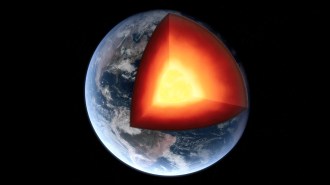Sunlight triggers the entry of poisonous mercury into polar lakes, but it also removes most of the toxic compound before fish can consume it, a new study suggests. The researchers warn that increased warming in the Arctic might upset this delicate balance.

With spring, light returns to the Arctic after a long, dark winter. That polar sunrise, however, has a dark side. It triggers a burst of photochemical reactions that mobilizes atmospheric mercury, speeding its fall into arctic lakes, where fish can consume it.
Recent studies suggest that when atmospheric mercury encounters light, gases such as ozone and sea spray–borne halogens oxidize it to a more reactive and water-soluble form. Attached to rain, snow, or dust, the reactive mercury falls into oceans or lakes, where sulfur-reducing bacteria transform it to methylmercury, the highly toxic form of the metal that accumulates in fish and other organisms (SN: 2/1/03, p. 72: Why the Mercury Falls).
To better understand what happens to mercury, a team of researchers led by biogeochemists Chad Hammerschmidt of Woods Hole (Mass.) Oceanographic Institution and William Fitzgerald of the University of Connecticut at Groton studied mercury in four Alaskan lakes roughly 250 kilometers south of the Arctic Ocean.
The team measured mercury entering the lakes from rainfall and as runoff from the surrounding tundra and then estimated how much methylmercury the bacteria in the lake sediments subsequently produced. The researchers also assessed whether the methylmercury was consumed by fish and other creatures or converted to less-toxic forms by light-based reactions in the lakes.
Hammerschmidt and his colleagues report that the more atmospheric mercury rains down, the more methylmercury the bacteria produce. Two-thirds of mercury in the atmosphere comes from human sources, such as fossil fuel burning, so more pollution would boost poisonous mercury concentrations in lakes, Hammerschmidt says.
More unexpectedly, the team discovered that light-triggered breakdown of methylmercury in the clear Arctic lakes is the main factor keeping the poison in check. Those reactions destroy as much as 80 percent of the poison before aquatic species can get to it, the team reports in the Feb. 15 Environmental Science & Technology.
The mechanisms of that photodecomposition are still poorly understood, Hammerschmidt says. Research on arctic mercury has focused on how it gets to Earth, rather than its terrestrial fate, he says.
This research is the first to demonstrate the importance of photodecomposition in mercury cycling, agrees Robert Stevens of the Environmental Protection Agency in Research Triangle Park, N.C. “It’s good science,” he says.
One spur to further study is the possibility that global warming could upset the Arctic’s delicate balance. In warmer and wetter weather, more mercury would fall and bacterial production of methylmercury would rise. At the same time, the rains might wash more organic material into lakes and oceans, reducing light penetration.
Hammerschmidt cautions that the same processes may also be occurring in temperate lakes, such as those in Wisconsin or Minnesota.






